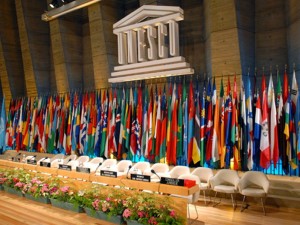 Two years after cutting off financial contributions to UNESCO, the United States of America lost its voting rights late last year (2013). UNESCO has been greatly supported by the U.S. since its inception and many experts and diplomats believe that this latest development will greatly undermine America’s ability to exercise its influence in countries around the globe through the United Nations agency’s educational and aid programs.
Two years after cutting off financial contributions to UNESCO, the United States of America lost its voting rights late last year (2013). UNESCO has been greatly supported by the U.S. since its inception and many experts and diplomats believe that this latest development will greatly undermine America’s ability to exercise its influence in countries around the globe through the United Nations agency’s educational and aid programs.
Under UNESCO’s constitution, any country that fails to pay dues for two years loses its vote in the UNESCO general assembly. The United States ceased all support for the agency in 2011, in response to a vote at UNESCO giving Palestinians full membership, and it was the first time that the U.S. had voluntarily given up its vote in a UN organization. The U.S. Congress enacted laws in the 1990s decreeing that the United States stop providing money to any United Nations agency that accepts Palestinians as full members.
UNESCO has expressed regret over the outcome and stated that what has happened is not some kind of punishment on behalf of UNESCO for nonpayment, but the rules and the organization feel very sorry as it has lost it’s biggest contributor as well as miss the voice of the U.S. on issues like freedom of expression and girls’ education.
Late in 2013, during the UNESCO general conference in Paris, The American ambassador to UNESCO, David T. Killion, spoke about the recent developments and noted that the U.S. had been involved in the United Nations Educational, Scientific and Cultural Organization since its beginnings in 1945 and promised that it would remain involved. He praised UNESCO for its role in consensus and peace building, saying the agency was important for American work abroad.
According to the reports, before withdrawing its financial support, the U.S. provided about $70 million, or 22 percent, of the agency’s annual budget, and the suspension was felt almost immediately. Some UNESCO staff members were laid off and programs and projects delayed, including some that potentially could have benefited the United States. In response, UNESCO created an emergency fund and got contributions from Saudi Arabia, Qatar, Norway and other countries.















